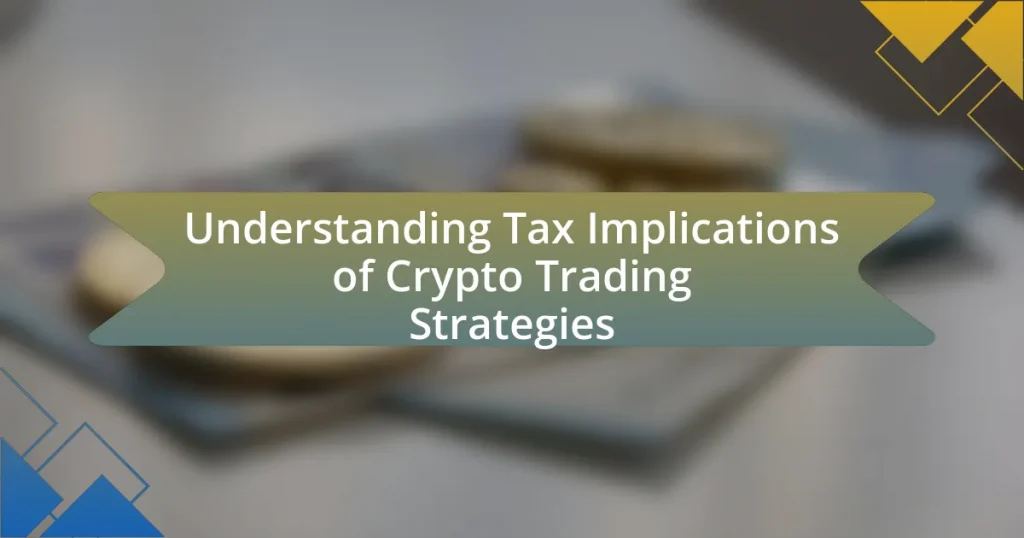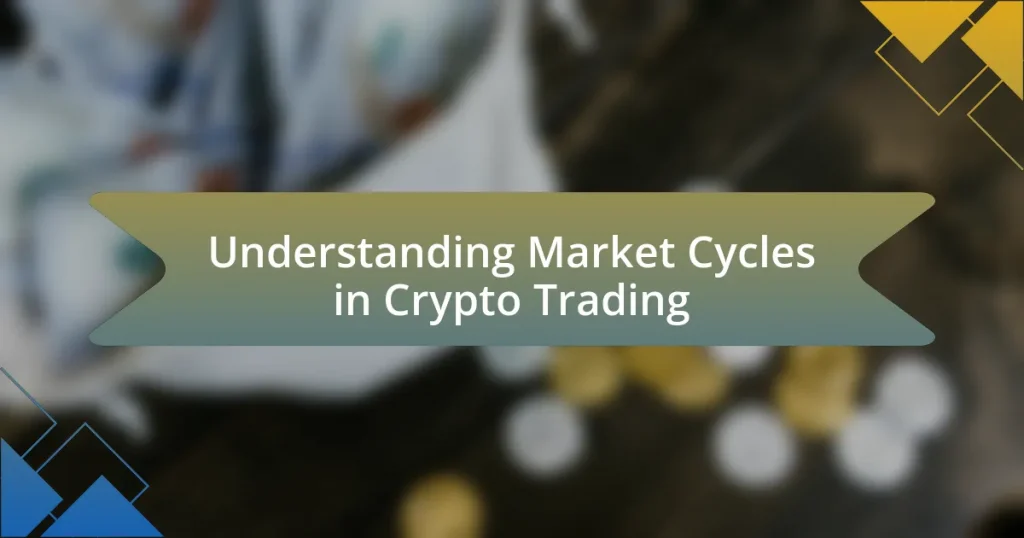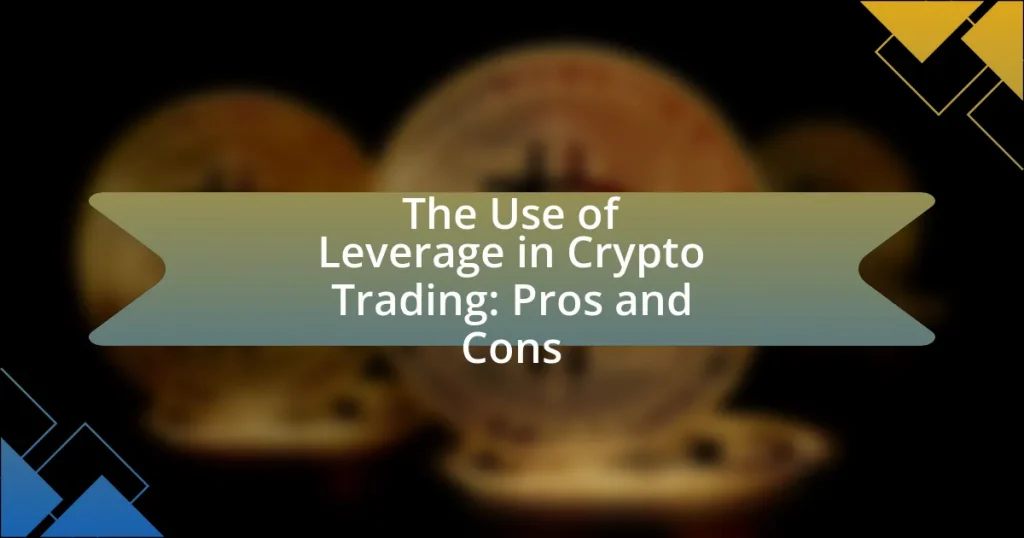The article focuses on the ethical considerations in trading within the cryptocurrency market, emphasizing the importance of transparency, market manipulation, and investor impact. It outlines key ethical principles such as integrity, fairness, and accountability, which are essential for maintaining trust and stability in a largely unregulated environment. The discussion includes the implications of unethical practices, such as market manipulation and their consequences on market integrity and participant trust. Additionally, it highlights best practices for ethical trading, the role of community engagement, and the significance of self-regulation in fostering a responsible trading ecosystem.

What are the ethical considerations in trading within the cryptocurrency market?
The ethical considerations in trading within the cryptocurrency market include transparency, market manipulation, and the impact on investors. Transparency is crucial as many cryptocurrencies operate in a decentralized manner, leading to potential information asymmetry where some traders may have access to insider information. Market manipulation, such as pump-and-dump schemes, undermines the integrity of the market and can lead to significant financial losses for unsuspecting investors. Additionally, the environmental impact of cryptocurrency mining raises ethical concerns, as the energy consumption associated with mining operations can contribute to climate change. These factors highlight the need for ethical standards and regulations to protect investors and promote fair trading practices in the cryptocurrency market.
How do ethical principles apply to cryptocurrency trading?
Ethical principles apply to cryptocurrency trading by emphasizing transparency, fairness, and accountability. Traders are expected to disclose relevant information and avoid deceptive practices, such as pump-and-dump schemes, which manipulate market prices for personal gain. The Financial Action Task Force (FATF) guidelines advocate for anti-money laundering (AML) and combating the financing of terrorism (CFT) measures, reinforcing the need for ethical conduct in trading activities. Additionally, the rise of decentralized finance (DeFi) platforms highlights the importance of user consent and informed decision-making, aligning with ethical standards that prioritize consumer protection and trust in the financial ecosystem.
What are the key ethical principles relevant to trading?
The key ethical principles relevant to trading include integrity, transparency, fairness, and accountability. Integrity requires traders to act honestly and uphold moral standards, ensuring that their actions do not deceive or manipulate others. Transparency involves providing clear and accurate information about trading practices, allowing all participants to make informed decisions. Fairness emphasizes equal treatment of all market participants, preventing practices like insider trading or market manipulation. Accountability holds traders responsible for their actions, ensuring they adhere to regulations and ethical standards. These principles are essential for maintaining trust and stability in the cryptocurrency market, where the lack of regulation can lead to unethical behavior.
How do these principles influence trader behavior?
The principles of ethics in trading significantly influence trader behavior by guiding decision-making processes and promoting responsible practices. Ethical principles, such as honesty, integrity, and fairness, encourage traders to avoid deceptive practices like market manipulation and insider trading. For instance, adherence to these principles can lead to increased trust among market participants, fostering a more stable trading environment. Research indicates that ethical trading practices can enhance long-term profitability and sustainability in the cryptocurrency market, as traders who prioritize ethics are less likely to engage in risky or illegal activities that could lead to regulatory scrutiny or market volatility.
Why is transparency important in cryptocurrency trading?
Transparency is crucial in cryptocurrency trading because it fosters trust among participants and reduces the risk of fraud. When traders have access to clear and accurate information about transactions, market conditions, and the underlying technology, they can make informed decisions. For instance, blockchain technology inherently provides transparency by allowing all transactions to be publicly recorded and verifiable, which helps prevent manipulation and enhances accountability. Studies have shown that markets with higher transparency levels tend to attract more participants, leading to increased liquidity and stability.
What role does transparency play in building trust among traders?
Transparency is crucial in building trust among traders as it fosters an environment of openness and accountability. When traders have access to clear and accurate information regarding market conditions, transaction histories, and trading practices, they are more likely to engage confidently in trading activities. For instance, studies have shown that platforms that provide transparent fee structures and real-time data on trades experience higher user satisfaction and retention rates. This correlation underscores the importance of transparency in establishing credibility and trust within the trading community.
How can lack of transparency affect market integrity?
Lack of transparency can severely undermine market integrity by fostering an environment conducive to manipulation and fraud. When market participants do not have access to clear and accurate information, it becomes easier for malicious actors to engage in practices such as insider trading, pump-and-dump schemes, and other forms of market manipulation. For instance, a study by the University of Cambridge found that 75% of cryptocurrency exchanges do not provide sufficient transparency regarding their trading volumes, which can mislead investors and distort market perceptions. This lack of reliable data can erode trust among participants, leading to decreased participation and increased volatility, ultimately compromising the overall stability and fairness of the market.
What are the potential consequences of unethical trading practices?
Unethical trading practices can lead to severe consequences, including legal penalties, financial losses, and damage to reputation. Regulatory bodies, such as the Securities and Exchange Commission (SEC), impose fines and sanctions on individuals and firms engaging in practices like insider trading or market manipulation. For instance, in 2021, the SEC charged a cryptocurrency company with fraud, resulting in a $1.2 million penalty. Additionally, unethical behavior can erode investor trust, leading to decreased market participation and liquidity. This was evident in the aftermath of the 2018 Bitconnect scandal, where unethical practices resulted in significant financial losses for investors and a collapse of the platform. Ultimately, the ramifications of unethical trading extend beyond individual cases, impacting the overall integrity of the cryptocurrency market.
How do unethical practices impact market participants?
Unethical practices significantly harm market participants by eroding trust and creating an uneven playing field. When individuals or entities engage in activities such as fraud, manipulation, or insider trading, they distort market prices and undermine the integrity of the trading environment. For instance, a study by the University of Cambridge found that 20% of cryptocurrency exchanges have been involved in wash trading, which artificially inflates trading volumes and misleads investors. This manipulation can lead to substantial financial losses for unsuspecting participants, as they may make investment decisions based on false information. Furthermore, unethical practices can result in regulatory crackdowns, which may restrict market access and innovation, ultimately affecting all participants negatively.
What legal ramifications can arise from unethical trading?
Unethical trading can lead to severe legal ramifications, including fines, sanctions, and criminal charges. Regulatory bodies such as the Securities and Exchange Commission (SEC) and the Commodity Futures Trading Commission (CFTC) impose penalties for practices like insider trading, market manipulation, and fraud. For instance, in 2021, the SEC charged a cryptocurrency company with fraud for misleading investors, resulting in a $1.2 million fine. Additionally, individuals involved in unethical trading may face criminal prosecution, which can lead to imprisonment. These legal consequences serve to uphold market integrity and protect investors from deceptive practices.

How does market manipulation affect ethical trading in cryptocurrencies?
Market manipulation severely undermines ethical trading in cryptocurrencies by creating an environment of deceit and misinformation. When individuals or groups artificially inflate or deflate prices through tactics such as pump-and-dump schemes or spoofing, they distort the true market value of assets. This manipulation leads to a loss of trust among investors, as ethical trading relies on transparency and fair competition. According to a 2020 report by the Blockchain Transparency Institute, over 80% of cryptocurrency trading volume is considered fake or manipulated, highlighting the prevalence of unethical practices. Such manipulation not only harms individual traders but also jeopardizes the integrity of the entire cryptocurrency market, making it difficult for ethical participants to operate effectively.
What forms of market manipulation are prevalent in the cryptocurrency market?
Market manipulation in the cryptocurrency market primarily includes practices such as pump and dump schemes, wash trading, and spoofing. Pump and dump schemes involve artificially inflating the price of a cryptocurrency through misleading statements, followed by selling off the asset at the inflated price, leading to significant losses for other investors. Wash trading occurs when a trader buys and sells the same asset to create misleading activity and inflate trading volume, which can mislead other traders about the asset’s demand. Spoofing involves placing large orders that are canceled before execution to create a false impression of market interest, influencing prices without actual trading intent. These manipulative practices undermine market integrity and can lead to regulatory scrutiny, as evidenced by actions taken by authorities like the U.S. Securities and Exchange Commission against fraudulent schemes in the cryptocurrency space.
How do pump and dump schemes operate?
Pump and dump schemes operate by artificially inflating the price of a cryptocurrency through misleading or fraudulent means, followed by selling off the asset at the inflated price. Typically, a group of individuals will coordinate to promote a specific cryptocurrency, often using social media or online forums, to create hype and attract unsuspecting investors. Once the price has risen significantly due to this artificial demand, the perpetrators sell their holdings, causing the price to plummet and leaving other investors with losses. This practice is illegal and considered a form of market manipulation, as it exploits the lack of regulation in many cryptocurrency markets.
What is wash trading and how does it mislead investors?
Wash trading is a deceptive practice where an investor simultaneously buys and sells the same financial instrument to create misleading activity in the market. This artificial trading inflates the perceived volume and price of an asset, leading other investors to believe there is genuine interest and demand. Consequently, unsuspecting investors may make decisions based on this false information, potentially resulting in financial losses when the inflated prices correct. Regulatory bodies, such as the U.S. Securities and Exchange Commission, have identified wash trading as a form of market manipulation, emphasizing its detrimental impact on market integrity and investor trust.
Why is it crucial to combat market manipulation?
Combating market manipulation is crucial because it ensures fair and transparent trading practices, which are essential for maintaining investor confidence and market integrity. Market manipulation distorts the true value of assets, leading to unfair advantages for certain traders and potential losses for others. For instance, the U.S. Securities and Exchange Commission (SEC) has reported that market manipulation can lead to significant financial harm, as seen in cases where fraudulent schemes inflated stock prices, resulting in billions in losses for investors. By addressing market manipulation, regulatory bodies can protect investors, promote equitable trading environments, and foster sustainable market growth.
What are the long-term effects of manipulation on market stability?
Long-term manipulation in markets typically leads to increased volatility and decreased investor confidence, undermining overall market stability. Historical instances, such as the 2017 cryptocurrency bubble, illustrate how manipulation can create artificial price surges followed by sharp declines, resulting in significant losses for investors and a lack of trust in the market. Furthermore, studies indicate that persistent manipulation can lead to regulatory crackdowns, which may further destabilize markets by introducing uncertainty and compliance costs.
How can traders protect themselves from manipulated markets?
Traders can protect themselves from manipulated markets by employing risk management strategies, conducting thorough research, and utilizing reliable trading platforms. Risk management strategies, such as setting stop-loss orders, help limit potential losses during market volatility. Conducting thorough research enables traders to identify unusual price movements and discern between genuine market trends and manipulative tactics. Utilizing reliable trading platforms with robust security measures and transparent operations further safeguards traders from potential fraud. Historical data shows that traders who implement these strategies are less likely to fall victim to market manipulation, as evidenced by studies indicating that informed traders can better navigate volatile environments.

What best practices can traders adopt to ensure ethical trading?
Traders can adopt several best practices to ensure ethical trading, including transparency, adherence to regulations, and responsible risk management. Transparency involves providing clear and accurate information about trading strategies and potential risks to all stakeholders. Adhering to regulations, such as those set by financial authorities, helps maintain market integrity and protects investors. Responsible risk management includes assessing the potential impact of trades on the market and avoiding manipulative practices, which can lead to market distortion. These practices are essential for fostering trust and sustainability in the cryptocurrency market, as evidenced by the increasing regulatory scrutiny and the need for ethical standards in trading activities.
How can traders promote ethical behavior in their trading activities?
Traders can promote ethical behavior in their trading activities by adhering to transparent practices and prioritizing integrity in their transactions. This includes disclosing relevant information about trades, avoiding manipulation of market prices, and ensuring compliance with regulatory standards. For instance, a study by the CFA Institute highlights that ethical trading practices not only enhance market integrity but also build trust among participants, which is crucial in the highly volatile cryptocurrency market. By fostering a culture of accountability and ethical decision-making, traders contribute to a more stable and trustworthy trading environment.
What tools and resources are available for ethical trading?
Tools and resources available for ethical trading in the cryptocurrency market include platforms that promote transparency, such as CoinMarketCap and CryptoCompare, which provide data on market capitalization and trading volumes. Additionally, ethical trading can be supported by using wallets that prioritize user privacy and security, like Ledger and Trezor. Furthermore, organizations like the Blockchain Association and the Crypto Ethics Foundation offer guidelines and best practices for ethical trading. These resources help traders make informed decisions that align with ethical standards, ensuring responsible participation in the cryptocurrency market.
How can community engagement foster ethical trading practices?
Community engagement can foster ethical trading practices by promoting transparency and accountability among traders. When communities actively participate in discussions about trading practices, they can collectively establish norms and standards that discourage unethical behavior. For instance, platforms like Reddit and Discord have facilitated open dialogues where traders share experiences and insights, leading to a more informed trading environment. Research indicates that communities that prioritize ethical discussions see a reduction in fraudulent activities, as members hold each other accountable. This collaborative approach not only enhances trust but also encourages adherence to ethical standards, ultimately benefiting the cryptocurrency market as a whole.
What are the benefits of adhering to ethical trading standards?
Adhering to ethical trading standards in the cryptocurrency market enhances trust and credibility among participants. This trust leads to increased investor confidence, which can result in higher trading volumes and market stability. For instance, a study by the Cambridge Centre for Alternative Finance found that ethical practices can significantly improve the reputation of trading platforms, attracting more users and fostering a healthier market environment. Additionally, ethical trading reduces the risk of fraud and manipulation, protecting both investors and the integrity of the market.
How does ethical trading enhance personal reputation in the market?
Ethical trading enhances personal reputation in the market by fostering trust and credibility among peers and consumers. When individuals engage in ethical trading practices, such as transparency, fairness, and adherence to regulations, they signal their commitment to integrity. This commitment can lead to positive word-of-mouth, increased customer loyalty, and a stronger professional network. Research indicates that companies with strong ethical standards often experience better financial performance and customer satisfaction, reinforcing the idea that ethical behavior is not only morally right but also beneficial for reputation. For instance, a study by the Harvard Business Review found that businesses perceived as ethical can command a price premium of up to 20% over their less ethical competitors, demonstrating the tangible benefits of a solid reputation built on ethical trading practices.
What positive impacts can ethical trading have on the overall cryptocurrency ecosystem?
Ethical trading can enhance the overall cryptocurrency ecosystem by fostering trust and promoting sustainable practices. When traders prioritize ethical standards, they contribute to a more transparent market, which can attract institutional investors and increase overall market stability. For instance, a study by the Cambridge Centre for Alternative Finance found that increased transparency in trading practices correlates with higher market participation and reduced volatility. Additionally, ethical trading encourages the development of regulations that protect consumers and promote fair competition, further solidifying the integrity of the cryptocurrency market.
What practical steps can traders take to maintain ethical standards?
Traders can maintain ethical standards by adhering to transparency, ensuring accurate reporting of trades, and avoiding deceptive practices. Transparency involves openly sharing information about trading strategies and potential risks, which fosters trust among peers and clients. Accurate reporting is crucial; traders should document all transactions honestly to prevent misinformation and uphold integrity. Additionally, avoiding deceptive practices, such as pump-and-dump schemes, is essential to protect the market’s integrity and maintain a fair trading environment. These steps are supported by regulatory frameworks, such as the Financial Industry Regulatory Authority (FINRA), which emphasizes the importance of ethical conduct in trading activities.
How can traders educate themselves about ethical trading practices?
Traders can educate themselves about ethical trading practices by engaging in comprehensive research, attending workshops, and following established ethical guidelines from reputable organizations. Researching literature on ethical trading, such as the CFA Institute’s Code of Ethics and Standards of Professional Conduct, provides foundational knowledge. Additionally, participating in workshops and webinars hosted by financial institutions or ethical trading organizations enhances understanding of real-world applications. Following industry leaders and ethical trading advocates on social media platforms also offers ongoing insights and updates on best practices.
What role does self-regulation play in ethical trading?
Self-regulation plays a crucial role in ethical trading by establishing standards and practices that promote integrity and accountability among traders. In the cryptocurrency market, where regulatory oversight may be limited, self-regulation helps mitigate risks such as fraud and market manipulation. For instance, industry groups like the Blockchain Association advocate for best practices and ethical guidelines, fostering a culture of transparency. This approach not only enhances trust among participants but also encourages compliance with ethical norms, ultimately contributing to a more stable and responsible trading environment.















